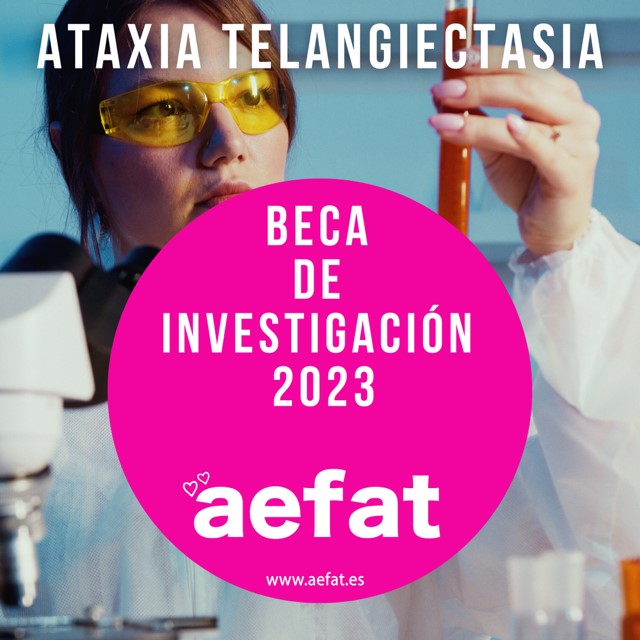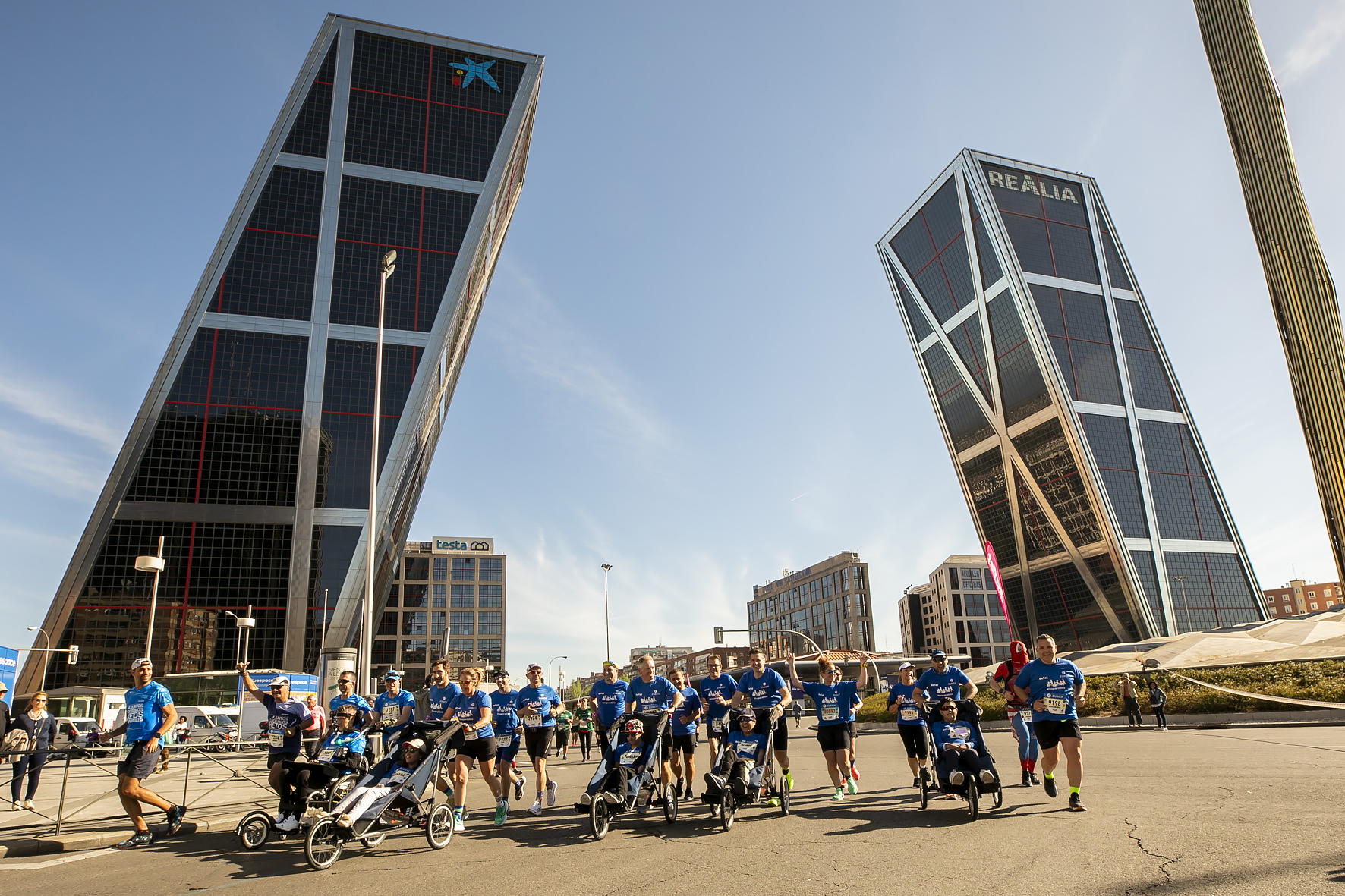
(English version below) Desde Aefat, la asociación que agrupa a las familias afectadas por ataxia telangiectasia en España, continuamos con nuestra lucha por la investigación de esta enfermedad rara que afecta al menos a 40 niños y jóvenes en España. Una enfermedad genética, neurodegenerativa y multisistémica, poco investigada, que aún no tiene cura ni tratamiento. Provoca una grave discapacidad física progresiva, inmunodeficiencia y alta probabilidad de cáncer, entre otras complicaciones.
Aunque entre nuestros objetivos también destaca la mejora de la calidad de vida de los pacientes y la sensibilización, la inversión en nuevas investigaciones es primordial para Aefat. Por ello, lanzamos esta segunda convocatoria internacional de 150.000 euros para proyectos de investigación que puedan contribuir a prevenir, mitigar y aliviar los efectos de la ataxia telangiectasia y, en última instancia, conducir a una cura.
Los candidatos pueden consultar las bases al final de este texto y deberán presentar un breve formulario de solicitud previa (ver abajo) antes de 11 de junio de este año. Se tendrán en cuenta solicitudes de cualquier parte del mundo, también multicéntricas, pero siempre que al menos uno de los centros pertenezca a un organismo de investigación pública, bajo la responsabilidad de un investigador principal que ocupe un puesto en esa institución durante toda la duración del proyecto.
En Aefat continuamos recaudando fondos para financiar proyectos de investigación sobre la enfermedad a través de distintas acciones y retos solidarios impulsados por las familias, y sumando donaciones de particulares y empresas. En la actualidad, en Aefat estamos cofinanciando ocho proyectos de investigación junto con asociaciones similares de otros países con los que colaboramos desde que fundamos juntos la A-T Global Alliance en 2020.
Entre nuestras acciones solidarias, destaca el Festival Solidario Aitzina Folk, creado en 2013 en Vitoria-Gasteiz, que ofrece más de 20 conciertos y talleres para todos los públicos en cada edición. Y la creación del Equipo Zurich Aefat en 2017, que participa en las cinco maratones que patrocina la empresa aseguradora en España (Sevilla, Barcelona, Madrid, San Sebastián y Valencia). Una iniciativa de deporte inclusivo que cuenta con la colaboración de más de cien corredores solidarios de toda España, que empujan las sillas especiales de los niños y jóvenes con ataxia telangiectasia durante esos 42 kilómetros en los diferentes maratones. Aefat también está presente en otros eventos benéficos y apoya diferentes retos deportivos solidarios. Además, también contamos desde el año pasado con la Cerveza Esperanza, una cerveza artesana solidaria creada en Sevilla.

PROYECTOS ANTERIORES
La primera beca que lanzó Aefat, valorada en 120.000 euros, fue adjudicada en 2015 a la investigadora Almudena Serrano para realizar su tesis doctoral sobre la relación entre roturas de ADN y el desarrollo de la enfermedad, en el Centro Andaluz de Biología Molecular y Medicina Regenerativa (CABIMER). Estuvo dirigida por el biólogo Felipe Cortés, científico titular del CSIC. Los primeros resultados de este proyecto fueron publicados en la revista Nature Communications en 2020.
Cortés, actual jefe de grupo en el Centro Nacional de Investigaciones Oncológicas (CNIO), forma ahora parte del Comité Científico de Aefat, junto con distintos investigadores y especialistas como Roberto Bilbao Urquiola, director científico del Biobanco Vasco; el bioquímico clínico José Antonio Navarro, del Hospital Universitario de Canarias; Óscar Fernández Capetillo, bioquímico del Centro Nacional de Investigaciones Oncológicas (CNIO) y la neuropediatra Ana Lola Moreno Vázquez, del Centro de Salud La Paz de Cádiz y profesora asociada de Pediatría de la Facultad de Medicina gaditana.
Asesorados por este Comité Científico, Aefat lanzó en 2018 su primera beca internacional, por 150.000 euros, que adjudicó al proyecto de terapia génica desarrollado por la Clínica Universidad de Navarra, con Felipe Prósper, en colaboración con el centro de investigación Cima Universidad de Navarra, con Borja Sáez. Los primeros resultados de este proyecto, ya prometedores, fueron publicados en 2019 en la revista Nature Communications junto con otros investigadores de las universidades de Harvard y Stanford en EEUU.
En 2021 Aefat decidió ampliar este proyecto con 83.000 euros para continuar la investigación en colaboración con la Universitat Pompeu Fabra (UPF) de Barcelona, con el investigador Marc Güell, incorporando la tecnología denominada FiCAT (Find and cut-and-transfer) que combina la precisión de CRISPR-cas9 y la capacidad de transferencia de genes de transposasas
El proyecto, denominado “Autotrasplante de médula ósea como cura para la inmunodeficiencia primaria característica de la ataxia telangiectasia: nuevas herramientas de edición génica y acondicionamiento no genotóxico”, continúa abierto hasta finales de este año. El objetivo es resolver la inmunodeficiencia primaria que va asociada a esta enfermedad rara y que conlleva hospitalizaciones frecuentes y fallecimientos de los afectados, bien por complicaciones respiratorias o bien por algunos tipos de cáncer.
SOBRE LA ATAXIA TELANGIECTASIA Y AEFAT
La ataxia telangiectasia (AT o A-T) es uno de los 300 tipos de ataxias que existen y provoca una grave discapacidad física progresiva. Es una enfermedad rara, genética y neurodegenerativa que se manifiesta habitualmente antes de los dos años de edad, aunque hay afectados que han esperado hasta 10 años para el diagnóstico porque se confunde con otras patologías. Afecta a las funciones de diferentes órganos y provoca incapacidad de coordinar movimientos, pérdida progresiva de movilidad (hacia los 9 años se necesita silla de ruedas), dificultad en el habla, estancamiento en el crecimiento, inmunodeficiencia, envejecimiento prematuro, dificultades para comer, problemas en la piel y en la visión, neumonías y otras complicaciones. Los pacientes son más proclives a los tumores malignos (como los sarcomas, linfomas, leucemias...).
Aefat es una asociación sin ánimo de lucro creada en 2009 y declarada de utilidad pública desde 2014. La asociación pertenece a FEDER (Federación Española de Enfermedades Raras), FEDAES (Federación de Ataxias de España) y la A-T Global Alliance (www.cureat.org), donde colabora con asociaciones similares europeas, americanas y australianas. Aefat también mantiene contacto cercano con las familias de afectados en Iberoamérica.
Más novedades en redes sociales de Aefat: Instagram, Facebook, Twitter y Youtube.
__________________________________________________________________________________________________________________
(ENGLISH VERSION)
At Aefat, the association that brings together families affected by ataxia telangiectasia in Spain, we continue our fight for research into this rare disease that affects at least 40 children and young people in Spain. A genetic, neurodegenerative and multisystemic disease, little researched, which still has no cure or treatment. It causes severe progressive physical disability, immunodeficiency and a high probability of cancer, among other complications.
Although our objectives also include improving the quality of life of patients and raising awareness, investment in new research is essential for Aefat. For this reason, we are launching this second international call for 150,000 euros for research projects that can help prevent, mitigate and alleviate the effects of ataxia telangiectasia and, ultimately, lead to a cure.
Candidates can consult the bases at the top of this text and must submit a brief pre-application form (see above) before June 11 of this year. Applications from any part of the world will be considered, including multicenter, but provided that at least one of the centers belongs to a public research organization, under the responsibility of a principal investigator who holds a position in that institution for the entire duration of the study. project.
At Aefat we continue to raise funds to finance research projects on the disease through different actions and solidarity challenges promoted by families, and adding donations from individuals and companies. Currently, at Aefat we are co-financing eight research projects together with similar associations from other countries with which we have collaborated since we founded the A-T Global Alliance together in 2020.
Among our solidarity actions, the Aitzina Folk Solidarity Festival stands out, created in 2013 in Vitoria-Gasteiz, which offers more than 20 concerts and workshops for all audiences in each edition. And the creation of the Zurich Aefat Team in 2017, which participates in the five marathons sponsored by the insurance company in Spain (Seville, Barcelona, Madrid, San Sebastián and Valencia). An inclusive sport initiative that has the collaboration of more than one hundred solidarity runners from all over Spain, who push the special chairs of children and young people with ataxia telangiectasia during those 42 kilometers in the different marathons. Aefat is also present at other charity events and supports different solidarity sports challenges. In addition, since last year we also have Esperanza Beer, a solidarity craft beer created in Seville.
PREVIOUS PROJECTS
The first grant launched by Aefat, valued at 120,000 euros, was awarded in 2015 to the researcher Almudena Serrano to carry out her doctoral thesis on the relationship between DNA breaks and the development of the disease, at the Andalusian Center for Molecular Biology and Regenerative Medicine (CABIMER). It was directed by the biologist Felipe Cortés, senior scientist at the CSIC. The first results of this project were published in the journal Nature Communications in 2020.
Cortés, current group leader at the National Cancer Research Center (CNIO), is now part of the Aefat Scientific Committee, along with different researchers and specialists such as Roberto Bilbao Urquiola, scientific director of the Basque Biobank; the clinical biochemist José Antonio Navarro, from the University Hospital of the Canary Islands; Óscar Fernández Capetillo, biochemist at the National Cancer Research Center (CNIO) and neuropediatrician Ana Lola Moreno Vázquez, from the La Paz de Cádiz Health Center and associate professor of Pediatrics at the Faculty of Medicine in Cádiz.
Advised by this Scientific Committee, Aefat launched its first international grant in 2018, for 150,000 euros, which it awarded to the gene therapy project developed by the Clínica Universidad de Navarra, with Felipe Prósper, in collaboration with the research center Cima Universidad de Navarra, with Borja Saez. The first results of this project, already promising, were published in 2019 in the journal Nature Communications together with other researchers from Harvard and Stanford universities in the US.
In 2021 Aefat decided to expand this project with 83,000 euros to continue the research in collaboration with the Universitat Pompeu Fabra (UPF) in Barcelona, with the researcher Marc Güell, incorporating the technology called FiCAT (Find and cut-and-transfer) that combines the precision of CRISPR-cas9 and the gene transfer capacity of transposases
The project, called “Autologous bone marrow transplantation as a cure for the primary immunodeficiency characteristic of ataxia telangiectasia: new tools for gene editing and non-genotoxic conditioning”, continues until the end of this year. The goal is to resolve immunodeficiency that is associated with this rare disease and that leads to frequent hospitalizations and deaths of those affected, either by respiratory complications or by some types of cancer.
ABOUT ATAXIA TELANGIECTASIA AND AEFAT
Ataxia telangiectasia (AT or A-T) is one of the 300 types of ataxias that exist and causes severe progressive physical disability. It is a rare, genetic and neurodegenerative disease that usually manifests itself before two years of age, although there are those affected who have waited up to 10 years for diagnosis because it is confused with other pathologies. It affects the functions of different organs and causes inability to coordinate movements, progressive loss of mobility (a wheelchair is needed around 9 years of age), difficulty speaking, growth stagnation, immunodeficiency, premature aging, eating difficulties, problems on the skin and vision, pneumonia and other complications. Patients are more prone to malignant tumors (such as sarcomas, lymphomas, leukemias...).
Aefat is a non-profit association created in 2009 and declared of public utility since 2014. The association belongs to FEDER (Spanish Federation for Rare Diseases), FEDAES (Spanish Ataxia Federation) and the A-T Global Alliance (www.cureat.org), where it collaborates with similar European, American and Australian associations. Aefat also maintains close contact with the families of those affected in Latin America.

